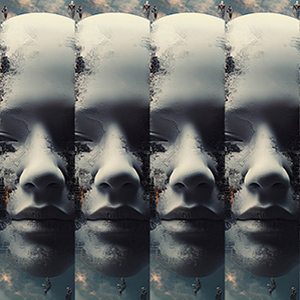"Liquidate AI Art"
Gary Hall
October 15, 2025
Gary Hall 6pm Wed. 15th October - Zoom only - recording available here
This talk expands on my recent book Masked Media: What It Means to be Human in the Age of Artificial Creative Intelligence. It argues for liquidating AI art, not out of a dismissal of artificial intelligence as techno-fascist, nihilist or parrot-like, but an insistence that art has always been created by assemblages of humans and nonhumans. There is no pure, authentic human creativity to distinguish from works generated with technologies like Stable Diffusion.
The talk references the International Coalition for the Liquidation of Art – whose members included Gustav Metzger, first editor of the CAS bulletin PAGE – and especially Frieder Nake's assertion in PAGE 18 that 'there should be no computer art'. For Nake, art should not be divided into commodifiable styles based on the tools used, but should instead function as a radical force capable of disrupting the hierarchies of the bourgeois art world.
Picking up on this challenge, 'Liquidate AI Art' shows how UK arts funding today overwhelmingly benefits upper- and middle-class, privately educated Oxbridge graduates. Efforts to promote inclusion through social mobility risk reinforcing this unjust system. What's needed is a redistribution of resources – e.g. through the liquidation of the UK's copyright regime – to support radically different artistic practices beyond the white, male, middle-class, liberal humanist norm.
Bio
Gary Hall is a media philosopher experimenting with new ways of working as a non-legacy critical theorist within today's 'techno-environmental-war complex'. He is Professor of Media at Coventry University, and founding co-director of the Centre for Postdigital Cultures. His books include: Masked Media: What It Means To Be Human in the Age of Artificial Creative Intelligence (explicitly co-written with a radically relational assemblage of humans and nonhumans, including AI); A Stubborn Fury: How Writing Works In Elitist Britain; and Pirate Philosophy. He is also co-founder of the open access journal Culture Machine and publisher Open Humanities Press.
